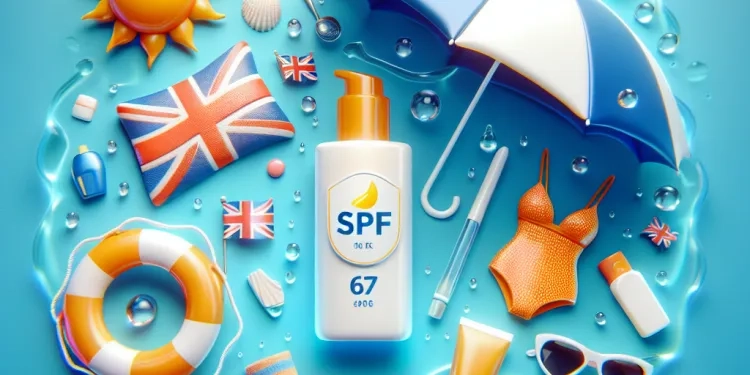
Find Help
More Items From Ergsy search
-

What SPF should I use if I have sensitive skin?
Relevance: 100%
-

Should I use a different SPF for my face and body?
Relevance: 61%
-

How does sunscreen with SPF 20 compare to SPF 50?
Relevance: 58%
-

What SPF should I use if I am going to be outdoors all day?
Relevance: 57%
-

Is a higher SPF always better?
Relevance: 57%
-

Can makeup with SPF replace sunscreen?
Relevance: 52%
-

What does SPF stand for?
Relevance: 51%
-

What SPF level is recommended to prevent sunburn?
Relevance: 50%
-

Do I need a different SPF for water-related activities?
Relevance: 49%
-

Skin cancer education
Relevance: 44%
-

Which factor sunscreen should I use?
Relevance: 43%
-

Skin Cancer - How do I check if my mole is skin cancer? | NHS
Relevance: 40%
-

Do sunbeds help improve skin tone and texture?
Relevance: 40%
-

What SPF is best for children?
Relevance: 39%
-

Is SPF 15 enough for everyday use?
Relevance: 39%
-

Is pre-tanning in a sunbed a good way to prepare my skin for sun exposure?
Relevance: 38%
-

Are skin lightening kist safe to use?
Relevance: 38%
-

What SPF is recommended for fair skin?
Relevance: 37%
-

How can I secure sensitive data stored on my phone?
Relevance: 32%
-

What SPF should I use if I have darker skin?
Relevance: 32%
-

What is a skin cancer screening?
Relevance: 32%
-

Are skin rashes a side effect of weight loss drugs?
Relevance: 31%
-

Does tanning lotion prevent sunburn?
Relevance: 30%
-

Coeliac Disease Explained - Gluten Sensitivity - A to Z of the NHS - Dr Gill
Relevance: 30%
-

Do sunbeds offer any anti-aging benefits for the skin?
Relevance: 29%
-

Hives - Skin Condition
Relevance: 29%
-

Do I need sunscreen on cloudy days?
Relevance: 28%
-

What's the difference between chemical and physical sunscreens?
Relevance: 27%
-

Is it true that sunbeds can help treat skin conditions like psoriasis?
Relevance: 27%
-

How important is it to keep the skin moisturised with psoriasis?
Relevance: 26%
-

Can dark-skinned individuals get sunburned?
Relevance: 25%
-

Why do some people not burn as easily as others?
Relevance: 25%
-

Self care - sunburn
Relevance: 24%
-

What is sunburn?
Relevance: 24%
-

Can sunburn turn into a tan?
Relevance: 23%
-

Can sunburn be prevented?
Relevance: 23%
-

What to do if you're sunburnt
Relevance: 23%
-

Self care - sunburn
Relevance: 20%
-

What is UV radiation?
Relevance: 20%
-

How often should I reapply sunscreen?
Relevance: 20%
Understanding SPF for Sensitive Skin
When selecting sunscreen, particularly for sensitive skin, it's crucial to understand the role of SPF and how it can protect your skin from harmful ultraviolet (UV) radiation. SPF, or Sun Protection Factor, measures the level of protection a sunscreen provides against UVB rays, the main cause of sunburn. Individuals with sensitive skin often experience more adverse reactions to environmental factors, making sun protection an essential part of their skincare regimen.
Choosing the Right SPF
For sensitive skin, it’s generally recommended to choose a sunscreen with at least SPF 30. This level of SPF blocks approximately 97% of UVB rays and offers sufficient protection for most people in the UK, including those with sensitive skin. Higher SPFs, such as SPF 50, provide slightly more protection, blocking about 98% of UVB rays. However, no sunscreen can offer 100% protection, so it's important to complement sunscreen use with other sun-safe practices.
Key Considerations for Sensitive Skin
When choosing a sunscreen for sensitive skin, look for labels that indicate the product is specifically formulated for sensitive skin or hypoallergenic. These products are less likely to contain ingredients that may cause irritation. It's also advisable to opt for sunscreens labeled 'fragrance-free' and 'paraben-free', as these additives can often irritate sensitive skin.
Mineral vs. Chemical Sunscreens
Sunscreens can be categorized into mineral (physical) and chemical filters. For sensitive skin, mineral sunscreens, which primarily use zinc oxide and titanium dioxide, are often recommended. These ingredients sit on the skin's surface and physically block UV rays, leading to less irritation compared to chemical filters, which absorb UV rays and may cause stinging or burning sensations.
Application and Reapplication
Proper application is vital to ensure effective sun protection, especially for sensitive skin types. Apply a generous amount of sunscreen 15 to 30 minutes before sun exposure. Don't forget areas like the ears, neck, and tops of the feet, which are often neglected. Reapply sunscreen every two hours or immediately after swimming, sweating, or towel drying, even if the product claims to be water-resistant.
Additional Sun Protection Measures
For those with sensitive skin, relying solely on sunscreen may not be enough. Incorporate additional protective measures such as wearing protective clothing, hats, and sunglasses. Seek shade during peak sun hours, typically between 11 a.m. and 3 p.m. in the UK, to minimize direct sun exposure.
Consult a Dermatologist
If you're unsure about which SPF or sunscreen formula is best for your sensitive skin, consider consulting a dermatologist. They can provide personalized recommendations based on your specific skin needs and help you find a product that minimizes irritation while providing adequate sun protection.
Frequently Asked Questions
What is SPF?
SPF stands for Sun Protection Factor, and it measures how well a sunscreen will protect skin from UVB rays, the kind of radiation that causes sunburn.
Why is SPF important for sensitive skin?
Sensitive skin can be more prone to irritation and damage from UV rays, so choosing the right SPF can help provide adequate protection and prevent adverse reactions.
What SPF level is recommended for sensitive skin?
For sensitive skin, it is recommended to use at least SPF 30, which blocks approximately 97% of UVB rays, providing a good balance between protection and acceptable reaction risk.
Should I choose a higher SPF if I have sensitive skin?
Higher SPF levels offer more protection, but they can sometimes contain more active chemicals that may irritate sensitive skin. It's best to start with SPF 30 or 50 and test how your skin reacts.
Is SPF 50 suitable for sensitive skin?
Yes, SPF 50 can be suitable. It offers more protection and blocks about 98% of UVB rays but ensure the formulation is suitable for sensitive skin.
What ingredients should I avoid in sunscreen if I have sensitive skin?
Avoid sunscreens with fragrances, parabens, oxybenzone, and other harsh chemicals. Mineral sunscreens with zinc oxide or titanium dioxide are usually preferable.
Are mineral sunscreens better for sensitive skin?
Yes, mineral sunscreens are often less irritating for sensitive skin as they contain physical blockers like zinc oxide or titanium dioxide, which sit on the skin's surface.
How often should I reapply sunscreen if I have sensitive skin?
Reapply sunscreen every 2 hours or immediately after swimming, sweating, or toweling off, even if you have sensitive skin.
Can sensitive skin react to sunscreen?
Yes, sensitive skin can react to certain ingredients in sunscreen, so it's important to choose products specifically formulated for sensitive skin and test on a small area first.
Is it necessary to use sunscreen indoors if I have sensitive skin?
Yes, UV rays can penetrate windows, so it is advisable to wear sunscreen indoors during prolonged exposure to sunlight, especially with sensitive skin.
Should people with sensitive skin use a moisturizer with SPF?
Yes, a moisturizer with SPF can provide daily protection and hydration, but ensure it's suitable for sensitive skin and offers broad-spectrum protection.
What's the difference between sensitive and normal skin in choosing SPF?
Sensitive skin may require sunscreens with fewer and simpler ingredients to avoid irritation, whereas normal skin may better tolerate a variety of formulations.
Can I use kids' sunscreen if I have sensitive skin?
You can use kids' sunscreen as they often have gentler formulations, which can be suitable for sensitive skin. However, always check the ingredients.
How do I test a sunscreen for sensitivity?
Apply a small amount of sunscreen to a patch of skin, such as inside the wrist, and observe for any reaction over 24 hours.
Should sensitive skin types avoid chemical sunscreens?
Those with sensitive skin may prefer mineral over chemical sunscreens to reduce the risk of irritation, though some chemical formulations may still be well-tolerated.
Why might sensitive skin react badly to SPF?
Sensitive skin might react to SPF due to harsh chemical filters, preservatives, or fragrances used in some formulations.
Does sensitive skin require hypoallergenic sunscreen?
Hypoallergenic sunscreens are often formulated to minimize the risk of allergic reactions, making them a good choice for sensitive skin.
Are there any SPF formulations specifically for sensitive skin?
Yes, many brands offer sunscreen options specifically formulated for sensitive skin, usually labeled as such and often mineral-based.
Is a water-resistant sunscreen necessary for sensitive skin?
If you are sweating or swimming, choose a water-resistant sunscreen for better protection, even for sensitive skin, ensuring it’s a suitable formulation.
Can sensitive skin benefit from sunscreen with added antioxidants?
Yes, sunscreens with added antioxidants like vitamin E or green tea extract can provide additional skin benefits and help reduce irritation for sensitive skin.
Useful Links
This website offers general information and is not a substitute for professional advice.
Always seek guidance from qualified professionals.
If you have any medical concerns or need urgent help, contact a healthcare professional or emergency services immediately.
Some of this content was generated with AI assistance. We’ve done our best to keep it accurate, helpful, and human-friendly.
- Ergsy carfully checks the information in the videos we provide here.
- Videos shown by Youtube after a video has completed, have NOT been reviewed by ERGSY.
- To view, click the arrow in centre of video.
- Most of the videos you find here will have subtitles and/or closed captions available.
- You may need to turn these on, and choose your preferred language.
- Go to the video you'd like to watch.
- If closed captions (CC) are available, settings will be visible on the bottom right of the video player.
- To turn on Captions, click settings .
- To turn off Captions, click settings again.
More Items From Ergsy search
-

What SPF should I use if I have sensitive skin?
Relevance: 100%
-

Should I use a different SPF for my face and body?
Relevance: 61%
-

How does sunscreen with SPF 20 compare to SPF 50?
Relevance: 58%
-

What SPF should I use if I am going to be outdoors all day?
Relevance: 57%
-

Is a higher SPF always better?
Relevance: 57%
-

Can makeup with SPF replace sunscreen?
Relevance: 52%
-

What does SPF stand for?
Relevance: 51%
-

What SPF level is recommended to prevent sunburn?
Relevance: 50%
-

Do I need a different SPF for water-related activities?
Relevance: 49%
-

Skin cancer education
Relevance: 44%
-

Which factor sunscreen should I use?
Relevance: 43%
-

Skin Cancer - How do I check if my mole is skin cancer? | NHS
Relevance: 40%
-

Do sunbeds help improve skin tone and texture?
Relevance: 40%
-

What SPF is best for children?
Relevance: 39%
-

Is SPF 15 enough for everyday use?
Relevance: 39%
-

Is pre-tanning in a sunbed a good way to prepare my skin for sun exposure?
Relevance: 38%
-

Are skin lightening kist safe to use?
Relevance: 38%
-

What SPF is recommended for fair skin?
Relevance: 37%
-

How can I secure sensitive data stored on my phone?
Relevance: 32%
-

What SPF should I use if I have darker skin?
Relevance: 32%
-

What is a skin cancer screening?
Relevance: 32%
-

Are skin rashes a side effect of weight loss drugs?
Relevance: 31%
-

Does tanning lotion prevent sunburn?
Relevance: 30%
-

Coeliac Disease Explained - Gluten Sensitivity - A to Z of the NHS - Dr Gill
Relevance: 30%
-

Do sunbeds offer any anti-aging benefits for the skin?
Relevance: 29%
-

Hives - Skin Condition
Relevance: 29%
-

Do I need sunscreen on cloudy days?
Relevance: 28%
-

What's the difference between chemical and physical sunscreens?
Relevance: 27%
-

Is it true that sunbeds can help treat skin conditions like psoriasis?
Relevance: 27%
-

How important is it to keep the skin moisturised with psoriasis?
Relevance: 26%
-

Can dark-skinned individuals get sunburned?
Relevance: 25%
-

Why do some people not burn as easily as others?
Relevance: 25%
-

Self care - sunburn
Relevance: 24%
-

What is sunburn?
Relevance: 24%
-

Can sunburn turn into a tan?
Relevance: 23%
-

Can sunburn be prevented?
Relevance: 23%
-

What to do if you're sunburnt
Relevance: 23%
-

Self care - sunburn
Relevance: 20%
-

What is UV radiation?
Relevance: 20%
-

How often should I reapply sunscreen?
Relevance: 20%


